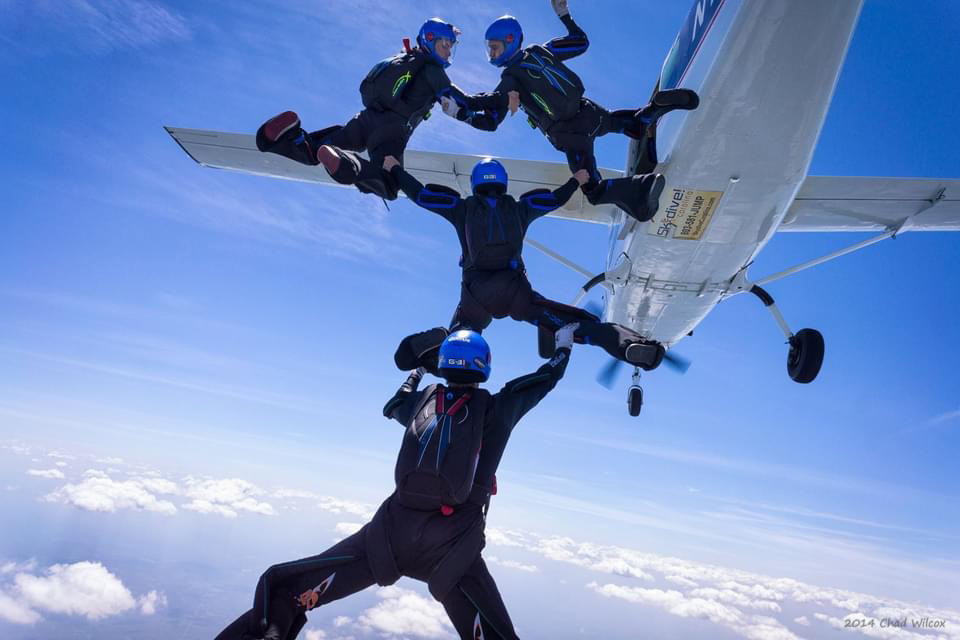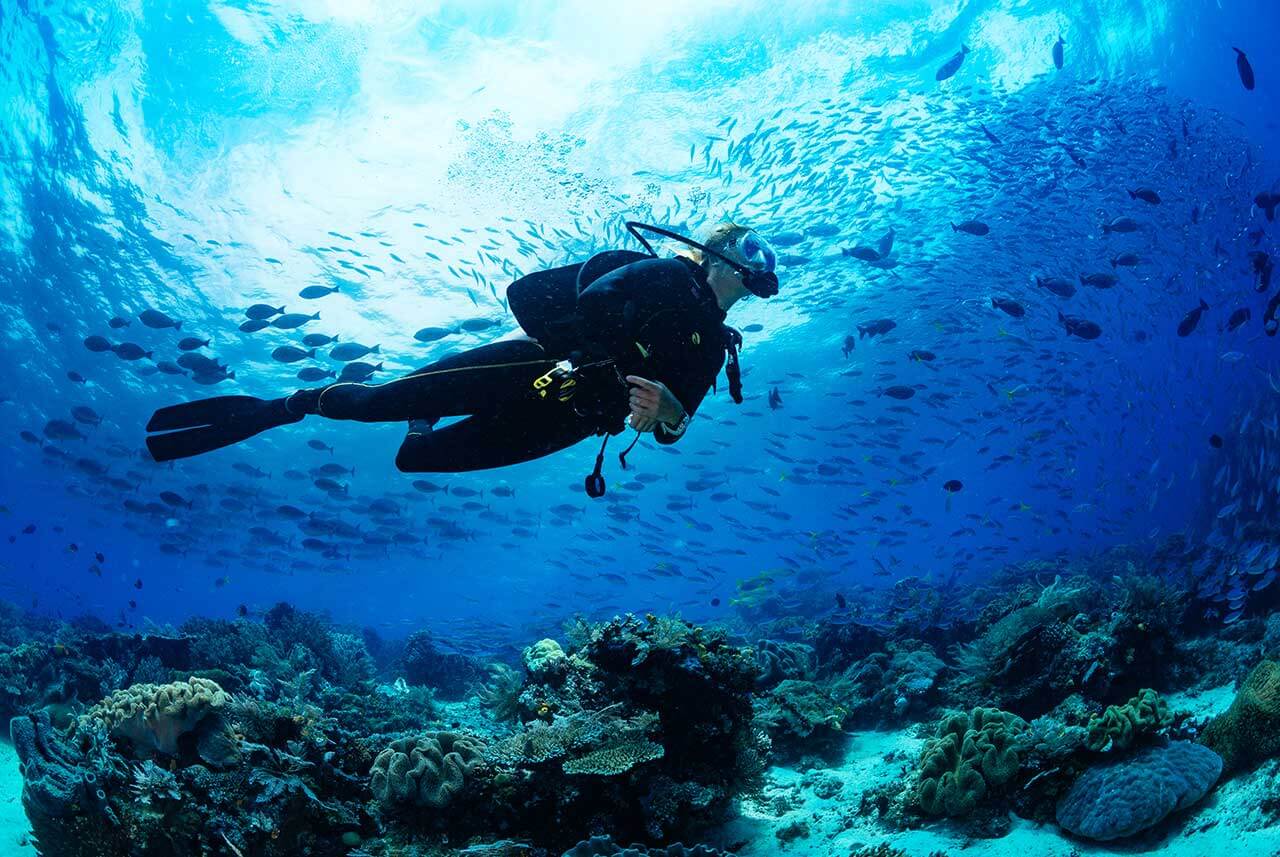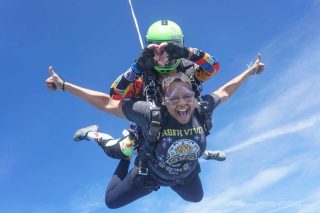Skydiving After Scuba Diving
General
1 year ago
Imagine a day filled with heart-pounding free falls amongst the clouds AND serene underwater explorations surrounded by the unseen wonders of our beautiful planet – the kind of adventure that only dreams are made of!
Skydiving and scuba diving are already incredible experiences all on their own but have you ever thought about combining them into the most epic day of your life? In this article, we’re diving deep (see what we did there?) into the excitement and potential dangers of merging these two thrilling activities.

Skydiving and Scuba Diving in the Same Day
While the idea of conquering the skies and the seas on the same day may sound like the most epic adventure, one should proceed with caution. One essential piece of information to keep in mind is the sequence in which you go about these activities. Skydiving before scuba diving is totally fine, however, the reverse order might lead to some not-so-fun consequences.
Why Can’t You Go Scuba Diving Before Skydiving?
Scuba diving before skydiving increases the risk of something called Decompression Illness (DCI), more specifically Decompression Sickness (DCS) and Arterial Gas Embolism (AGE).
Decompression Sickness (DCS)
As you dive deeper into the water, your body absorbs nitrogen gas from the breathing gas in proportion to the surrounding pressure. Ascending to the surface slowly allows the gas to be eliminated naturally through your lungs. If the diver ascends too quickly to an area of low pressure (like skydiving), the nitrogen may form bubbles in the tissues, joints, and bloodstream. This phenomenon can cause joint pain, or ‘the bends’, in minor cases. However, a higher volume of bubbles can travel up the spinal cord and brain causing numbness, paralysis, impaired coordination, and disorders of higher cerebral function. In more serious cases, large numbers of bubbles can enter the bloodstream, lungs, and eventually, circulatory shock can occur. Yikes!
Mild DCS Symptoms (Type 1)
- Muscle or joint pain
- Skin rashes, itching, or swelling
- Tissue tenderness
- Unusual fatigue
Serious DCS Symptoms (Type 2)
- Numbness, tingling, or muscle weakness
- Difficulty walking or loss of coordination
- Confusion or impaired cognitive functions
- Vertigo or spinning sensation
- Chest pain or difficulty breathing
- Bladder or bowel dysfunction
- Tinnitus or hearing loss
Arterial Gas Embolism (AGE)
AGE is the more serious form of DCI. AGE usually happens when a diver ascends without exhaling or in an uncontrolled manner, making the air that is trapped in the lungs expand. This may rupture lung tissue, causing pulmonary barotrauma, which will release the gas bubbles into the arterial circulation. AGE is when these bubbles block healthy blood flow in small vessels, including in the brain! These cases are potentially fatal, are true medical emergencies, and require a speedy trip to a medical facility. AGE may also involve minor symptoms such as neurological dysfunction, tingling or numbness, weakness without obvious paralysis, or difficulty thinking.
Symptoms of AGE:
- Dizziness
- Blurred visual
- Areas of decreased sensation
- Chest pain
- Disorientation
- Paralysis or weakness
- Convulsions
- Unconsciousness
- Death

How Long After Scuba Diving Can You Skydive?
The amount of time you have to wait after scuba diving can vary based on the type of scuba diving you are doing. The Divers Alert Network (DAN) suggests taking longer surface intervals to further reduce the risk for DCS and waiting to fly or skydive at least:
- 12 hours after a single day of no decompression diving
- 18 hours after a multi-day or repetitive no decompression dives
- 24 hours after a mandatory decompression dive
Safety is our top priority, and that’s why the Federal Aviation Administration (FAA) recommends waiting at least 24 hours after any scuba dive before flying or going skydiving from altitudes above 8,000 ft. Since we jump from 14,000 ft here at Skydive Carolina, we strongly recommend following this guidance and waiting at least 24 hours after scuba diving. Give your body the time it needs to adjust to pressure changes and off-gas any accumulated nitrogen. This waiting period significantly reduces the risk of decompression illness during your skydiving experience. It is our job to mitigate as many risks as possible so everyone can have a safe and enjoyable skydive – we promise, it’s worth the wait!
How to Plan Your Epic Adventure
Now, let’s turn your dream of scuba and skydiving on the same day into a reality!
There’s nothing wrong with getting your scuba dive on after your skydive. Luckily, Skydive Carolina is conveniently located just an hour from a popular dive location, Lake Murray. Lake Murray is home to boat wrecks, bridges, railroad trestles, rock ledges, house foundations, and a stone house! Another popular location is a few hours away just off the coast in Myrtle Beach. Barracuda Alley has many artificial platforms for divers to enjoy and spot barracudas, spanish mackerel, spade fish, black sea bass, and gobies. Be sure to check out The Shermann and the Charleston Tug dive locations as well!
Skydive Carolina is also just 15 miles away from a local dive shop, Scuba Ventures, where you can set up a tour, training, or purchase/rent equipment.
Start your epic adventure by booking your skydiving reservation before scuba with Skydive Carolina! Blue skies.




